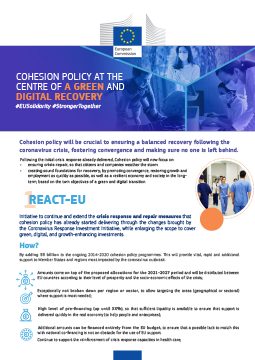The Commission has unveiled its proposal for a major recovery plan following the coronavirus pandemic. Cohesion policy will play a key role in ensuring a balanced recovery, fostering convergence and making sure no one is left behind. The REACT-EU package For the current programming period, REACT-EU ( Recovery Assistance for Cohesion and the Territories of Europe) will deliver €55 billion of additional funds that will be made available to the ERDF and the ESF as well as to the European Fund
- 28 May 2020

The Commission has unveiled its proposal for a major recovery plan following the coronavirus pandemic. Cohesion policy will play a key role in ensuring a balanced recovery, fostering convergence and making sure no one is left behind.
The REACT-EU package
For the current programming period, REACT-EU ( Recovery Assistance for Cohesion and the Territories of Europe) will deliver €55 billion of additional funds that will be made available to the ERDF and the ESF as well as to the European Fund for Aid to the Most Deprived (FEAD). These additional funds will be provided in 2020-2022 through a targeted revision to the current financial framework.
REACT-EU will continue and extend the crisis response and crisis repair measures delivered through the Coronavirus Response Investment Initiative and the Coronavirus Response Investment Initiative Plus. The package will provide additional funding for the most important sectors that will be crucial to lay the basis for a sound recovery. This will involve investment to support job maintenance, including through short-time work schemes and support for the self-employed. The funds can also be used to support job creation and youth employment measures, to health care systems and the provision of working capital and investment support for small and medium-sized enterprises. Such support will be available across economic sectors, including for the much-affected tourism and culture sectors. The additional support will also serve to invest in the European Green Deal and digital transition, as an enhancement to the significant investment in those areas that is already taking place through EU cohesion policy.
The new long-term EU budget
The focus of the EU cohesion policy in 2021-2027 remains the economic competitiveness through research and innovation, digital transition as well as the European Green Deal agenda and the promotion of the European Pillar of Social Rights.
In order to match the ambitions of the European Green Deal of moving to a climate-neutral economy by 2050, the funding must be commensurate. As a result, the support available for the Just Transition Fund has been increased from 7.5 billion to 40 billion.
The new proposal also reinforces support for the preparedness of health systems and ensures better exploiting of the potential of culture and tourism. At the same time, it provides support to workers and to measures addressing youth unemployment and child poverty.
In addition, EU countries will have additional flexibility, compared with the current programming period, to transfer resources among the funds at any point in time of the programming period. The proposal also introduces further flexibility to enable the phasing of smaller operations, which will give EU countries more time to complete such operations not finished under the 2014-2020 programmes.
The amounts proposed in 2018 per thematic priority and per Member State remain valid.
More information
